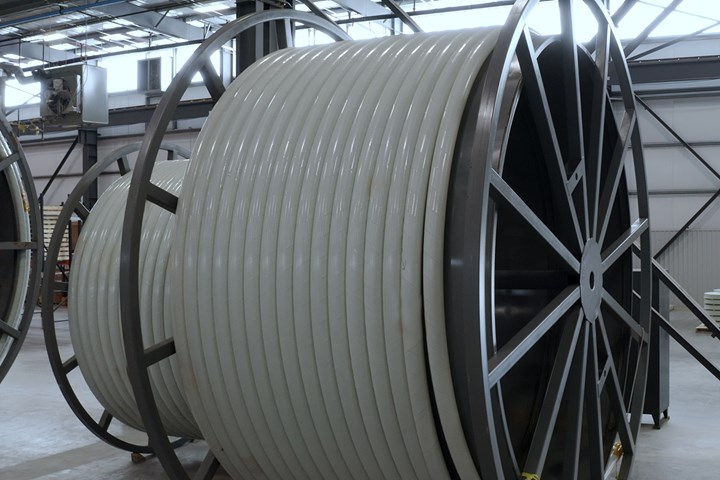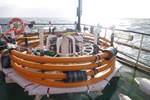Baker Hughes expands non-metallic products with new composite flexible pipe for onshore pipelines
New, 400,000-square-foot facility in Houston will increase composite pipe capacity by 3-4X for applications in multiple markets, part of strategic investment in non-metallics growth.

Photo Credit: Baker Hughes
Baker Hughes (Houston, Texas, U.S.) has launched its next-generation Onshore Composite Flexible Pipe to address the corrosion and cost of ownership challenges with conventional steel pipe for the oil and gas, energy and industrial sectors.
The flexible, lightweight reinforced thermoplastic pipe (RTP) offers an economic and environmentally superior alternative to resource-intensive onshore steel pipes, for optimizing the core structure of flowline and oil and gas pipeline networks. A key feature of the pipe is its proven spoolable design, making it easier, faster and more cost-effective to transport and install versus steel pipe — reducing installed costs by more than 20%. Installation also requires fewer onsite support facilities and heavy vehicles, de-risking operations, taking up less width on a pipeline right-of-way and reducing environmental impact on surrounding land.
“This pipe is the result of our strategic investments for growth in innovative non-metallic materials,” says Hatem Haidar, global vice president of flexible pipe systems - onshore at Baker Hughes. “We are committed to supporting safer, more efficient and cost-effective technical solutions to serve the energy sectors, and non-metallics play a key role. We see flexible pipe as a vital component of today and tomorrow’s energy and industrial sectors — enabling the transport of multiple energy sources, including hydrogen and natural gas.”
Baker Hughes’ Onshore Composite Flexible Pipe offers an economic solution for the transport of CO2 and hydrogen, as well as the conversion of existing infrastructure to carry gases. In addition, the pipe’s non-corrosive materials can withstand contaminants without requiring chemical inhibitors, corrosion monitoring/inspection or disruptive repair work — significantly reducing operating expenditures.
The Onshore Composite Flexible Pipe technology draws on years of Baker Hughes’ experience in developing advanced composite solutions for the highly demanding offshore environment, now applicable for onshore and industrial customers. The composite pipe will be manufactured at Baker Hughes’ state-of-the-art facility in Houston, Texas. With a 400,000-square-foot footprint, the facility will provide 3-4 times additional manufacturing capacity compared to Baker Hughes’ current capacity for flexible pipe solutions. The pipe will be available up to 8 inches in diameter, with a variety of liners including nylon, polyphenylene sulfide (PPS), and high-density polyethylene (HDPE), and deliver fluid pressures up to 2,250 PSI.
Related Content
-
Composites end markets: Energy (2024)
Composites are used widely in oil/gas, wind and other renewable energy applications. Despite market challenges, growth potential and innovation for composites continue.
-
Composites end markets: Batteries and fuel cells (2024)
As the number of battery and fuel cell electric vehicles (EVs) grows, so do the opportunities for composites in battery enclosures and components for fuel cells.
-
Novel composite technology replaces welded joints in tubular structures
The Tree Composites TC-joint replaces traditional welding in jacket foundations for offshore wind turbine generator applications, advancing the world’s quest for fast, sustainable energy deployment.











.jpg;maxWidth=300;quality=90)



